
Life vs. Productivity:
Dahr Jamail, Truthout | Op Ed
If someone broke into your house, pinned down your loved ones and began pouring poison down their throats, would you stop that person?
What if someone poured crude oil all over your crops and livestock? Wouldn't you try to stop them from doing it?
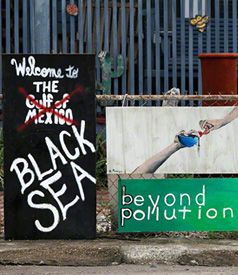
People in Louisiana expressing their feelings about the BP oil disaster. (Photo: Erika Blumenfeld © 2010)
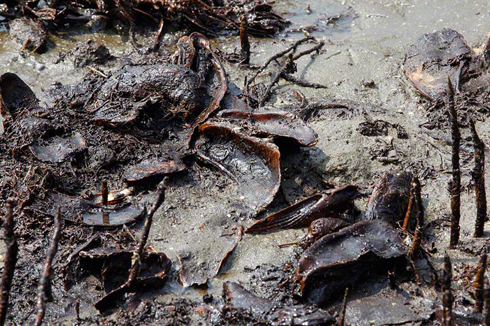
Oyster beds soaked in BP oil. (Photo: Erika Blumenfeld © 2010)
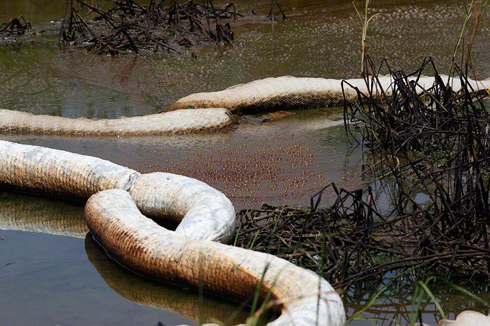
Oil filled inland lagoon on Timbalier Island, Louisiana. (Photo: Erika Blumenfeld © 2010)
Pointed questions like these come from a man named Derrick Jensen. They provide a lens through which to view the havoc that corporate capitalism is wreaking on our planet. They are meant to jolt us into the awareness that we are watching life on earth annihilated. They are also meant to challenge us into thinking about what form our resistance to this should take.
"I think what we need to do is to stop deluding ourselves into believing that those in power will do what they have not done and they've shown no inclination to do, which is to support life over production," says Jensen, an author and environmental activist who lives in Northern California.
Lewis Mumford, a US historian and philosopher of science and technology, has written, "The chief premise common to both technology and science is the notion that there are no desirable limits to the increase of knowledge, of material goods, of environmental control; that quantitative productivity is an end in itself and that every means should be used to further expansion."
But how can unlimited growth and productivity be possible on a planet with finite resources?
Simple answer: It cannot.
Yet, we are all being pushed, at breakneck speed, toward a future that promises catastrophic global climate change, depleted natural resources, environmental degradation and human chaos and suffering on an apocalyptic scale.
One hundred and twenty species of life are erased from the planet each day.
Ninety percent of all the pelagic fish in the oceans are gone.
The Arctic ice cap is vanishing before our eyes as global temperatures continue to rise.
Here are some recent headlines from this summer:
- Greenland Ice Sheet loses 100 square miles, biggest loss since 1962 (Aug. 2010)
- Russia's drought-driven halt to wheat exports panics world grain markets (Aug. 2010)
- Pakistan's worst flood in recorded history claims some 1,100 lives (July, 2010)
- International study confirms accelerating warming trend (July, 2010)
- Rapid decline in phytoplankton population stuns scientists (July, 2010)
- Flash floods seen increasing as Milwaukee gets eight inches in two hours (July, 2010)
- Senate climate bill collapses (July, 2010)
- Coral reef deaths soar in record ocean heat (July, 2010)
- First half of 2010 was hottest such period on record (July, 2010)
- Carbon lobby launches "CO2 is Green" campaign (July, 2010)
- Massive Greenland glacier retreats one mile in one night (July, 2010)
- Military declares climate change "a catalyst for conflict" (June, 2010)
- Malaria soars with small rainforest reductions (June, 2010)
- Oceans have stored more heat than they released since 1993 (May, 2010)
- Climate change is causing "irreversible" destruction of ocean life systems (June, 2010)
- Himalayan glacier melt puts 60 million people at risk of food shortages (June, 2010)
- Warming pushes many small mammal species to the brink (June, 2010)
This is happening not because any of us want it, but because those in power, answerable only to their corporate sponsors, are playing out their mantra of "every means should be used to further expansion."
Expansion of growth. Expansion of profits. Expansion of power.
Mumford has said a change in this mindset of perpetual expansion would likely only happen with "an all-out fatal shock treatment, close to catastrophe, to break the hold of civilized man's chronic psychosis."
We have already had many of these "fatal shock treatments:" the Exxon Valdez spill, the Union Carbide disaster in Bhopal, Chernobyl, Hiroshima, Nagasaki, Agent Orange, Love Canal, Three Mile Island, the Seveso Italian dioxin crisis, the Baia Mare cyanide spill. These are just a few. It's a long list.
And, now, we can add the BP disaster in the Gulf of Mexico.
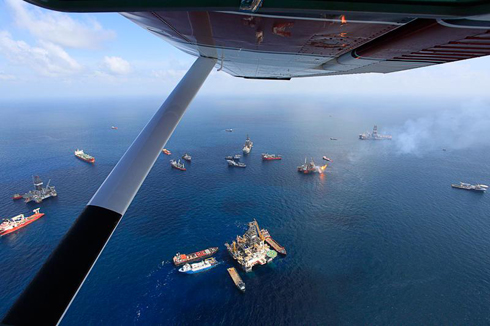
View of "The Source." (Area of Gulf of Mexico directly above the Macondo Well after the explosion and sinking of the Deepwater Horizon Rig.) (Photo: Erika Blumenfeld © 2010)
BP's oilrig in the Gulf of Mexico exploded in April and, for 36 hours, its flames released immeasurable amounts of toxins into the atmosphere before it sunk into the depths. We now know that the vast majority of the oil that gushed from the well was intentionally submerged by BP via heavy use of dispersants at the wellhead, so most of the oil is floating around in giant undersea plumes, one of which is ten miles long, three miles wide and 300 feet thick. They are like oil bergs - what we see on top of the water is a mere fraction of what lies beneath. This was not an oil leak. This was a volcano of oil gushing into the Gulf of Mexico.
If independent estimates of the amount of oil released into the Gulf are correct, as many as one Exxon Valdez load of oil (250,000 barrels worth) was being released into the Gulf of Mexico every two and a half days. That means 8,700,000 barrels of oil, or 34 Exxon Valdez's worth, were released into the Gulf of Mexico.
Conversely, what actions have been taken to bring BP to account? Will the CEO likely spend time in jail? Government officials and institutions that have colluded with BP - how about them being brought to justice?
When the Exxon Valdez struck a reef in Prince William Sound in Alaska in 1989, the incident was considered to be among the most devastating human-caused environmental disasters in history.
Even after the surface oil is cleaned up in the Gulf of Mexico, scientific studies already show (as they have shown in Prince William Sound) that oil can remain trapped in the seabed for decades, continuing to contaminate and kill fish, shrimp, crabs and bird life. To this date, a maximum of only 14 percent of the oil spilled in that disaster has been recovered. As you read this, BP is scaling down the response efforts to the Gulf disaster.
Meanwhile, as the so-called free market that allows unchecked corporate powers like BP to pollute and destroy our ecosystems with impunity continues, the oil spreads across the Gulf and another oil platform has exploded in the Gulf, this time 80 miles south of Louisiana.
Jensen believes that expecting those in power to do what is right for human beings, much less the planet, "is delusional." "Their function in a democracy is to give us the illusion of power, but the truth is that they do what they want," Jensen explains. "Why is it that cops are always called in to break strikes but not help the strikers? When the function of the state is to support the privatization of profits and the externalization of costs, what kind of state is this?"
Jensen, a prolific writer and author of several books, including "A Language Older Than Words" and "Endgame," summarizes the situation we face like this: "The point is that when a gold mining corporation spreads cyanide all over the mine and this hits our groundwater and wells and destroys ground waters in Montana, they are not called a terrorist, they are called a capitalist."
The same can be said for BP. Exxon. Monsanto. Bayer. Dow. Lockheed Martin. It's a long list.
"If it was space aliens coming down and systematically changing the planet, would we appeal to them through lawsuits, take off our clothes and make peace symbols, petitions?" Jensen asks. "I was once being interviewed by a dogmatic pacifist and he felt that I wanted all activists to act like assassins. That's not true. What I want is for all activists to act like they are serious about their resistance and that might include assassinations."
Jensen believes that we are at a point in history where the very planet upon which we live and our lives are at stake. If the perpetual growth, corporate-capitalist-industrial machine is allowed to continue, we will die. Thus, it must be stopped by any means necessary.
To illustrate what might be possible by taking a militant approach, Jensen points to Johann Georg Elser, the man who attempted to assassinate Adolph Hitler in 1939.
"Everyone agrees that if Hitler was killed in 1939, the war doesn't happen," Jensen explains, "The point is that I want people to think like members of a resistance. The first thing that means is to start thinking away from being part of a capitalist industrial system and away from this government that we all acknowledge serves corporations better than us and toward the land where we live."
Many are concerned that the approach Jensen advocates will generate extreme government crackdowns on activists working on topics across the political spectrum - that the use of violence to promote change is a bankrupt strategy and one that is doomed to failure.
"I am not the violence guy," is Jensen's response, "I'm really the everything guy. Only two percent of the IRA ever picked up weapons. 98 percent were doing support work. We need a wide range of tactics, which can include fighting back and attacking the infrastructure. I don't know what is so radical or incendiary about believing that living oceans are more important than a social structure. The culture as a whole suffers from insanity, one form of which is that this social structure is more important than the living planet. I don't believe you can suffer the delusion that you can systematically dismantle a planet and live on it. It's very simple to me. Life is more important than capitalism."
* * *
Many activists have argued that nonviolence is the only path that will lead to positive, lasting change in society. Thich Nhat Hanh, a Buddhist monk, teacher, author, poet and activist, is a man Martin Luther King Jr. called "an apostle of peace and nonviolence." In Saigon during the early 1960s, he organized students to rebuild bombed villages, resettle families and create agricultural coops. His work, then as now, is based on the Buddhist principles of nonviolence and compassionate action.
Voices like Hanh's tell us that violence begets violence, a theory backed by thousands of years of historical evidence.
Some, like influential German Jewish political theorist Hannah Arendt, argue that the use of violence, while at times effective in destroying power, "Is utterly incapable of creating it." Arendt's work dealt with the nature of power that she explored via investigations of politics, authority and totalitarianism.
Arendt believed that true freedom was synonymous with collective political action among equals.
Organized nonviolent power, on a massive scale, like that by the movement behind Gandhi in India, could possibly avoid these draconian measures while destabilizing the corporate centers of power.
* * *
Jensen does not advocate the use of violence as a means toward taking control of, or even overthrowing, the US government. Instead, he encourages small groups of people to do what their government has failed to do. For example, he asks, "What would happen if police started enforcing cancer free zones, or rape free zones, or toxics free zones?" He goes on to answer his rhetorical question, "We could start putting together forces that say, "You will not toxify this land and we will stop you. If people came into our homes and started to pour poison down our throats, we would stop them."
In Oakland, California, in the 1960s, police brutality against African-Americans was rampant. But when the Black Panthers decided to arm themselves, load into cars and trail the police, beatings of African-Americans decreased dramatically.
Click here to get Truthout stories like this one sent straight to your inbox, 365 days a year.
A modern-day example is The Pink Sari Gang, a group of women in India who wear pink saris and train in the martial arts. "If they see a man abusing a woman, they beat the crap out of him," Jensen says, "If they see the police abusing the poor, they step in. This dramatically reduces domestic violence."
Jensen is not the first person to suggest the use of violence against those in power. Malcolm X also took on the establishment in the 1960s by indicting white America in the harshest of terms for its crimes against blacks, and he remains one of the most influential African-Americans in history.
"We declare our right on this earth ... to be a human being, to be respected as a human being, to be given the rights of a human being in this society, on this earth, in this day, which we intend to bring into existence by any means necessary," is perhaps his most famous quote. While he was clear about only using violence in self-defense, Malcolm X was also clear on the issue of nonviolence: "It is criminal to teach a man not to defend himself, when he is the constant victim of brutal attacks," he said.
* * *
Could these tactics succeed in the United States today?
Assassinations, sabotage and other violent acts geared toward stopping the corporate capitalist system might remove some corporate CEOs and temporarily slow ecological destruction, but the CEOs would immediately be replaced and the violence and sabotage would most certainly be used to justify draconian measures applied to the general public, thus, making further resistance more challenging.
The US government response to armed resistance in the 1960s and 1970s resulted in National Guardsmen killing unarmed anti-war protesters on college campuses and the FBI assassination of Black Panther leader Fred Hampton in Chicago. Government spying and surveillance of resistance leaders was rampant, as was exposed by the COINTELPRO files being made public.
Arendt was critical of the tactics of Malcolm X and the Black Panthers for advocating violence, along with being critical of other groups in the 1960s in the US who did the same, like the Weathermen who carried out dozens of bombings of government targets in response to the war in Vietnam. Arendt wrote, "In a head-on clash between violence [military] and [collective nonviolent resistance] power, the outcome is hardly in doubt."
Yet, her critique of the failure of governments' use of violence to quell nonviolent movements is equally harsh: "Nowhere is the self-defeating factor in the victory of violence over [collective nonviolent] power more evident than in the use of terror to maintain domination, about whose weird successes and eventual failures we know perhaps more than any generation before us."
Arendt could easily count the failing US empire project among her "eventual failures" in this analysis. Indeed, one can argue that the US empire project, which is essentially run by a corporate, capitalist, hegemonic ideology, is being crushed under its own weight. This is evidenced by the ongoing global financial crisis and the escalating human-made climate change.
Hailing the religions of infinite growth and perpetual profit within the confines of a finite plane is truly an example of the proverbial snake eating its own tail. So, why not leave it to eat itself, then rebuild and reconfigure ourselves to live closer to the land after the juggernaut collapses?
* * *
We do not have the luxury of that kind of time. Scientists now tell us that the Arctic ice cap will likely be ice free in the summer within ten years. When this happens, rather than reflecting sunlight, that area then turns into a heat absorbing sink that dramatically increases the rate of climate change and overall planetary warming.
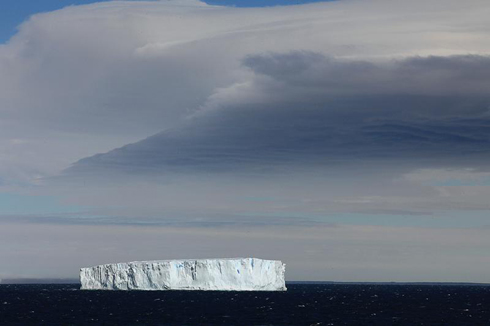
Iceberg calved from the Antarctic Ice Shelf. (Photo: Erika Blumenfeld © 2010)
By late 2009, two different studies showed seven years straight of a loss of Antarctic ice at a rate of 190 gigatonnes per year and the rate was increasing with time.
Some political scientists and currently serving US senators and Congresspersons now argue that our system of so-called representative government is so broken and corrupted that it is beyond its capability of righting itself.
Thirty years ago, people in the United States used to make fun of the Soviet Union and the Politburo because the body of the latter was approximately 97 percent populated by communist members. Thus, the legitimacy of the Politburo was erased.
"What percentage of the members of the Senate and House of Representatives are capitalist party members [politicians who subscribe to the so-called free market system]?" Jensen asks. "Suddenly it's not so funny, is it? I ask people all over the country, 'Do you believe we live in a democracy?' And almost nobody ever says yes. I ask, 'Does the government take better care of corporations or human beings?' Of the thousands of people I ask this to at talks, nobody says human beings and this is not even to speak of salmon."
Jensen says every morning when he wakes up, he asks himself if he should write or blow up a dam. "You and I can write all we want, but that doesn't help the salmon," he tells me, "What they need is for dams to be removed and logging stopped."
His incisive pragmatism disregards any concern for upsetting people, groups or adherence to what is politically correct. He is spurred forward in his work because the urgency of the situation demands it. Jensen believes that all forms of resistance, nonviolent, violent and everything in between, are important and useful. But he does not hesitate to point out where he feels some methods do not go far enough.
Someone Jensen singles out as an example of how current tactics of resistance are not enough is Bill McKibben. In 1988, McKibben, a well-known author, environmentalist and activist wrote "The End of Nature," the first book for a common audience about global warming. He is the co-founder of 350.org, an international climate campaign to bring awareness to the fact that the planet faces both human and natural disaster if atmospheric concentrations of CO2 remain above 350 parts per million (ppm). Right now, we are at 390 ppm and climbing.
Last December, just prior to the UN Climate Change Conference in Copenhagen that had enacted no useful legislation to curb carbon emissions, McKibben penned an article for Mother Jones magazine. In it, he wrote, "The latest numbers from the computer jockeys at Climate Interactive - a collaboration of Sustainability Institute, Sloan School of Management at MIT and Ventana Systems, is that if all the national plans now on the table were adopted the planet in 2100 would have an atmosphere with 770 parts per million CO2."
"Bill McKibben has done a wonderful job of publicizing the threat from global warming," Jensen says, "He's been doing it for a long time, with incredible stamina and work and I have incredible respect for that."
But Jensen insists that the tactics of McKibben's group 350.org do not go far enough.
"So the question I have, not only for Bill, but for everyone is, what is your threshold? Give me one at which you'll stop believing in and petitioning those in power and will begin direct attacks on the oil infrastructure. Is it 440ppm? 450? 570? When the planet turns into Venus? What is your threshold? We need stop them before they kill the planet."
Applying tactics like those used by the Black Panthers, the Weathermen or Malcolm X would most likely lead to government security crackdowns that far surpass those used in the 1960s.
It is also a given that business-as-usual activism is not getting the job done. That the goal of opening "free markets" is written into the US National Security Strategy means that the march toward "freedom" really means a freedom for corporate interests to gobble up resources, pillage and pollute our common land base (and oceans, seas, Gulfs) and continue to exploit the underprivileged labor base in the US and abroad.
* * *
In April 2004, I watched local Iraqis in Fallujah, armed with Kalashnikov machine guns and rocket propelled grenade launchers, repel the most powerful military machine on the globe when US occupation forces attempted to invade their city. In 2006, during the Israeli attack of Lebanon, I saw Hezbollah, using little more than what the Iraqis used in Fallujah, repel an invasion by the Israeli military - a military defeat Israeli smart weapons, sophisticated US-made fighter jets and drones could do nothing to prevent.
"History provides many examples of successful resistance, as do current events," writes Jensen, who maintains a regular column for Orion magazine called "Upping the Stakes." In the March/April issue he wrote, "The Irish nationalists, the abolitionists, the suffragettes - I could fill the rest of this column with examples. Recently, the Movement for the Emancipation of the Niger Delta (MEND) has, through attacks on oil pipelines and the kidnapping of oil workers, disabled as much as 40 percent of the oil industry's output from Nigeria and some oil companies have even considered pulling out of the region. If those of us who are the primary beneficiaries of this global system of exploitation had 1 percent of their courage and commitment to the land and community, we could be equally effective if not more so. We have vastly more resources at our disposal and the best we can come up with is, what, compost piles? The world is being killed and many environmentalists still think that riding bikes is some sort of answer?"
Jensen told me that MEND was, for a long time, nonviolent, but after one of their leaders was killed, they moved toward using sabotage, then finally to violent resistance.
Jensen adds in his column, "MEND has said to the oil industry: 'It must be clear that the Nigerian government cannot protect your workers or assets. Leave our land while you can or die in it.' There is more courage, integrity, intelligence and pragmatism in that statement from MEND than in any statement I have ever read by any American environmentalist, including myself. We need to accept the fact that making this type of statement (and being prepared to act on it) might be necessary to preserve a living planet. Some people may be willing to give up on life on this planet without resisting. I'm not one of them."
Jensen urges people to "think for themselves," as he feels this is the most important first step toward true freedom.
"I want them to decolonize their hearts and minds," he explains. "That means to recognize that this culture is not the only way to live. This is one culture. To recognize that technological progress is not progress. It is escalation. It improves the ability of those in power to make matter and energy jump through hoops on command. If sea turtles were developing all kinds of technology that was killing the planet, we would not call it progress."
For all of us who are or want to be actively involved in work that might shape a better future for the planet, it is imperative we know what we love and care about most. Given the vast number of issues (climate change, militarism, corporate capitalism etc.) that need our immediate attention, coupled with the severity of crisis many of them encompass, it is easy to be overwhelmed.
"What would you live and die to protect?" Jensen suggests we ask ourselves. "Fight by any means, whether that be by a lawsuit or a gun? Is it your family, survivors of domestic violence, salmon, the Rio Grande River? What is it you love enough that you would fight to defend?"
Apathy and learned helplessness are now endemic in the US. The massive anti-war demonstrations on February 15, 2003, that preceded the Iraq war were ignored by the Bush administration. That administration went on to shred the US Constitution, openly advocate torture and enrich war-profiteering companies like Halliburton, Dyncorp and Bechtel in Iraq. People felt as though nothing could be done.
When tens of millions of US citizens voted in Barack Obama as president, they hoped real change for the better was upon them. Many of those people now feel betrayed by his broken promises. Guantanamo Bay, that he promised to close, remains open. The US occupation of Iraq, that he promised to end, continues with no real end in sight. Rather than acting as the peace president many hoped he would be, President Obama has tripled the number of soldiers in Afghanistan since he took office. It's a long list. Millions of US citizens now feel they are at a loss.
"Do you believe that our culture will undergo a voluntary transformation to a sane and sustainable way of living?" asks Jensen.
"For the last several years I've taken to asking people this question, at talks and rallies, in libraries, on buses, in airplanes, at the grocery store, the hardware store. Everywhere. The answers range from emphatic 'No's' to laughter. No one answers in the affirmative. One fellow at one talk did raise his hand and when everyone looked at him, he dropped his hand, then said, sheepishly, 'Oh, voluntary? No, of course not.'
"My next question: how will this understanding - that this culture will not voluntarily stop destroying the natural world, eliminating indigenous cultures, exploiting the poor and killing those who resist - shift our strategy and tactics? The answer? Nobody knows, because we never talk about it: we're too busy pretending the culture will undergo a magical transformation."
Jensen asserts what millions around the world can corroborate - systematic abuse of the poor and helpless leaves lasting scars on entire generations. He compares this culture to an abusive family, where violence is a constant threat and the victims feel helpless and dependent on the abuser. He writes, "Civilization and the civilized continue to create a world of wounds."
"From birth on - and probably from conception, but I'm not sure how I'd make the case - we are individually and collectively acculturated to hate life, hate the natural world, hate the wild, hate wild animals, hate women, hate our bodies, hate and fear our emotions, hate ourselves. If we did not hate the world, we could not allow it to be destroyed before our eyes. If we did not hate ourselves, we could not allow our homes - and our bodies - to be poisoned."
* * *
"I say, do something," Jensen urges. "The big dividing line is not between those who advocate resistance through any means necessary and those who don't. It's not even between grassroots and mainstream. The big divide is between those who do something and those who don't."
Business-as-usual activism and politics will guarantee catastrophic climate change, more environmental disasters like what we are witnessing in the Gulf of Mexico and continued corporate depravity. Wherever people stand in the debate on the use of violence versus nonviolence, Jensen's sense of urgency at this moment in history is unarguable.
So, where do you stand?
Sept. 5, 2010
